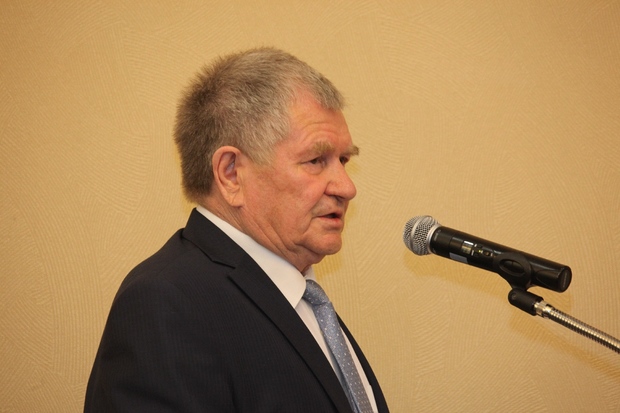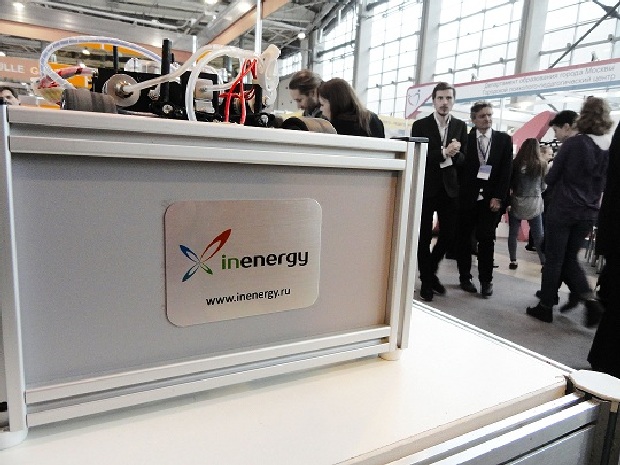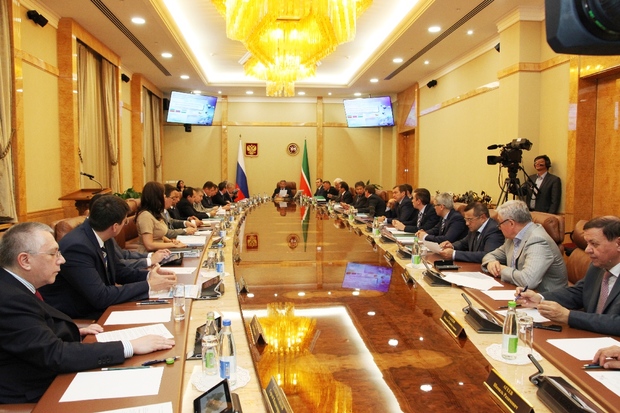'An American oil company, which is 5-10 times smaller than Tatneft, is more expensive’
What prospective investment projects in petrochemistry and oil refinery can Tatarstan and Bashkortostan fulfil together? What is more effective – fuel cells or rechargeable batteries? How is it possible to reduce the losses and increase the capitalisation of Tatarstan companies by means of non-material assets? These questions were discussed at the next meeting of the board of directors of Tatneftekhiminvest-holding PJSC. Traditionally, it was headed by President of Tatarstan Rustam Minnikhanov.
'Ural was against…'
Presidents of Tatarstan and Bashkortostan set a task to elaborate a Cooperation Development Concept between Gas and Petrochemical Complexes of the Republics of Tatarstan and Bashkortostan.
Director general of Tatneftekhiminvest-holding Rafinat Yarullin reminded that the petrochemical complex of Tatarstan accounts for 57% of the industrial production, while in Bashkortostan this indicator is 40%.
Establishment of priority areas of cooperation development, definition of types of production volumes for mutual deliveries, choice of projects for cooperative fulfilment and preparation of the personnel for the petrochemical sectors of the regions — these are some goals of the concept.
Some Tatarstan companies already work with their colleagues from the neighbouring republic. For example, Kazanorgsintez has experience in cooperation with Bashgiproneftekhim and is ready to strengthen it by purchasing the raw material and catalysts from the enterprises of Gazprom Neftekhim Salavat, Ufaorgsintez, Ufanftekhim. Tatneft also cooperates with the Institute of Oil and Chemical Refinery.
Rafinat Yarullin marked possible cooperative investment projects of the two regions. He reminded about the largest projects fulfilled in the republic: the Heavy Residues Deep Conversion Complex in TAIF-NK, Ethylene Complex in Nizhnekamskneftekhim, increase of the capacity of the primary oil refinery in Taneco, production of olefin from natural gas. Enterprises of Tatarstan can cooperate with Bashneft, Gazprom Neftekhim Salavat, Polyester, Bashkhim in chemistry and petrochemistry.

'The enterprises of the gas and petrochemical complex of both republics are historically connected. We need to maintain and develop it,' the director general of Tatneftekhiminvest-holding is convinced. 'We will work with our neighbours.'
Deputy director general of Development Corporation of the Republic of Bashkortostan PJSC Denis Fomin noted the cooperation between the enterprises of Tatarstan and Bashkortostan develops in all directions: from design to equipment and commodity supply. In his opinion, it is necessary to create a working group consisting of the specialists from the key enterprises of the regions to fulfil the concept. Denis Fomin thinks they also need to coordinate the market of the products made by the regions within the scope of the working group.
Rustam Minnikhanov remembered the petrochemical complexes of the republics were integrated during the Soviet era. But the possibilities to 'connect' them were lost: 'Ural (Editor's Note: Rakhimov, a son of the ex-President of Bashkortostan Murtaza Rakhimov and former director general of Bashneft) was against, though Murtaza Rakhimov understood this topic. We had to build one petrochemical complex, then start the construction of the second one.
President of Tatarstan asked to talk about the plan on the cooperation of the two republics in detail, create working groups and meet at least once per quarter. 'We have great skills, including in oil refinery, construction of petrochemical complexes. This experience can be sold. We are not rivals to each other but help,' the head of Tatarstan supposes.
Fuel cells – from mobile devices to 'electric trucks'
'The next topic is very interesting – development prospects of the fuel cell market,' Rustam Minnikhanov announced the next speaker and couldn't help but ask: 'What will win: fuel cells or rechargeable batteries?' And he immediately demonstrated his good knowledge of the topic: 'Fuel cells have several advantages. There is only one question: how to produce hydrogen?'
'The fuel cell market is actively developing in North America, Southeast Asia and partially in Europe,' director general of InEnergy (Moscow) PLC Aleksey Kashin told. Honda and Toyota already produce hydrogen cars.

Fuel cells produced by InEnergy PLC use hydrogen or hydrocarbon fuel. They are able to perform different tasks. For instance, fuel cells of Astra series can provide a backup electric power supply for mobile phones, hospitals and banks. Constant power systems called Gammas are designed for a reliable central or auxiliary power supply in industrial facilities.
'The battery life of the equipment is 40,000 hours or 5 years of continuous performance. In fact, the result we achieved was 16,000 hours or 2 years of continuous performance,' director of the holding Aleksey Kashin impressed the members of the board of directors.
The director general of InEnergy told to what sectors of the industry fuel cells of the company can be applied. They can be used in KAMAZ as power units. Aleksey Kashin said 'we even worked on an 'electric truck' based on KAMAZ'. Fuel cells also can be applied for backup power supply, be an alternative to rechargeable batteries in gas and oil sector and provide the municipal infrastructure of Kazan.
'Our task is the organisation of batch production of fuel cells. And Kazan is a right innovative place for it,' the director general of InEnergy specified the intentions.
President of Tatarstan set the Ministry of Construction, Architecture and Housing and Communal Services of Tatarstan a task to study the possibilities of use of fuel cells together with the enterprises of the gas and petrochemical and energy complexes of Tatarstan.
Limit current
'I've seen your unit. Reliability of electricity supply of our petrochemical enterprises, in particular, is very important. This is why I asked to make the presentation of the unit that has no analogues in the world,' Rustam Minnikhanov was complimentary about products of SuperOx LLC (Moscow).
Director general Sergey Samoylenkov told about the elaborations of the company – current limiters used in industry. Current limiter is an innovative device for energy saving.

The necessity of the use of current limiters in energy systems is connected with a growth of short-circuit currents because of the rise in electricity use, development of generating capacities and electricity transmission systems. The growth of short-circuit currents leads to accident risk increase in power engineering and more need for expensive equipment. Current limiter protects energy systems from overloads and allows to reduce the damage of energy communications from short circuit currents; prolong the lifespan of the already used equipment; increase fire safety; provide a low level of loss in the communications and improve the quality of electricity supply.
President of Tatarstan offered the representatives of Tatneft, Grid Company, Generating Company and the enterprises of TAIF GC to talk to SuperOx about the possibility to use current limiters in the enterprises of the republic.
To gas
Products made by Adast (the Czech Republic) is interesting for the republic because it excellently matches the projects on the development of gas equipment, which Tatarstan carries out together with Gazprom. Adast produces fuel dispensers that can use liquefied or compressed natural gas.
It should be noted that in June, at the opening of the next three NGV Gas stations in Tatarstan, chairman of the board of directors of Gazprom Viktor Zubkov announced that the gas monopolist is going to invest 80bn rubles in the construction of new stations – up to 480-500 by 2020. It is planned NGV Gas stations will have appeared in all big cities of the republic by 2018. It will enable public transport to use gas.
Rustam Minnikhanov reminded that Tatarstan will have its own gas-liquefying complex. Gazprom Gaz and Motor Fuel will build it. 'Village will start using liquefied natural gas. When the factory appears, we will need a technology on how to fill cars with this type of fuel. It will be done in the short run,' President of Tatarstan defined a possibility for cooperation.
To make money fast
The next speaker promised to cope with such global problems as a reduction of losses of the enterprises of Tatarstan and increase of their capitalisation. Director general of the Financial Business Development Institute (Moscow) Ildar Shaykhutdinov told about the results of audits in the facilities of intellectual property of the regional enterprises. 'How can we make money fast?' Rustam Minnikhanov enquired and was given a detailed answer.

The Financial Business Development Institute counted that 5,938 facilities of intellectual property were registered in Tatarstan. Such companies as Tatneft, KAMAZ, Tatspirtprom, Nizhnekamskneftekhim, Tatenergosbyt, Kazanorgsintez, TNG-group account for 30% of them.
The economic effect of the implementation of results of the intellectual activity for 3 years has made up 40bn rubles. How do the companies use this potential? In Ildar Shaikhutdinov's opinion, it is declared only. These innovations don't influence the capital of a company.
During 3 years the companies invested 507m rubles in research and elaborations. Meanwhile, the economic effect was estimated at 5,5bn rubles. A tenfold growth might seem great!
At the same time the companies make obvious mistakes. For instance, a technician who created some know-how wants to leave his job; he will take his elaborations and technologies to his own company or to rivals. Enterprises don't use the economic effect of the implementation of intellectual property to reduce the prime cost. 'Accountants, economists don't know how to capitalise intellectual property,' the director of the institute presented a problem.
'Unfortunately, many companies work in reverse,' Rustam Minnikhanov stated. 'Profit is to be demonstrated to public companies. Private companies use all mechanisms, so that there is no profit and they don't need to pay. Your words are very important for us. We will use all your recommendations. An American oil company, which is 5-10 times smaller than Tatneft, is more expensive. Our companies are underestimated. This is why Tatneft and the enterprises of TAIF GC need to work in order to increase the capitalisation manifold.'